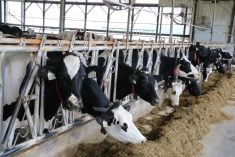The price of farmgate dairy will rise after a mid-year request to raise the price of the supply-managed commodity to deal with rising costs of production due to inflationary pressures.
Dairy producers had made the request to the Canadian Dairy Commission last month. The Crown corporation that manages production agreed to a 2.5 percent increase to take effect Sept. 1.
The increase comes on top of an 8.4 percent increase that took effect in February.
In its release, the CDC cited the rising costs of feed, energy and fertilizer ranging from 22 to 55 percent as part of its rationale in agreeing to a mid-season price adjustment.
Read Also

Huge Black Sea flax crop to provide stiff competition
Russia and Kazakhstan harvested huge flax crops and will be providing stiff competition in China and the EU.
The CDC also noted the consumer price index for dairy has risen 7.7 percent over the last five years compared to 14 percent for meat products, 21 percent for eggs and 32 for fish.
Al Mussell, research lead at the Canadian Agri-Food Policy Institute, said the increase reflects a supply-managed system working as it should as input costs soar.
There is precedent for a mid-season adjustment that is usually determined in the fall, usually in response to substantial challenges faced by the industry such as BSE or feed price spikes.
“Milk prices are going up, which isn’t that surprising because we are in this inflationary cycle,” said Mussell.
Such price increases tend to sharpen criticism of the supply-management system, which Mussell dismissed.
“This is silly stuff,” he said, pointing out large retailers often market dairy products such as cheese as a loss leader. “Stores want a discount product to drive people into the grocery store. For whatever the reason in Canada, dairy products have been one of the favoured products to drive traffic.”
Mussell said milk’s supply-managed system may have in fact softened the blow to consumers as the ability to increase costs requires regulatory approval.
“In this particular environment, I suppose you can say the supply-managed system helped keep the price down, temporarily at least,” he said. “You look at your packaged goods, basically your grain-based products, you have significant increases in them.”
According to CDC, the interim price increase will be credited against its usual annual analysis, which takes place later this year.
The CDC also noted that the milk price increase in Canada has been lower at 6.6 percent than the European Union at 23 percent in the past year and 49 percent in the United States.


















